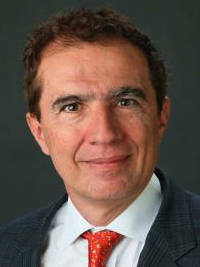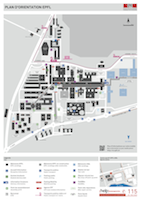Go to
Giovanni De Micheli
 Professor
Professor
Institute of Electrical Engineering, Director
Integrated Systems Laboratory
Swiss Federal Institute of Technology (EPFL), Lausanne, Switzerland
Why Again Logic Synthesis?
Thursday, 10 December 2015 at 9:00 in room BC 420
Abstract:
Logic circuit design and optimization emerged in the 1950s with the pioneering work at Bell Laboratories and IBM Research. The widespread use of semicustom logic design in the eighties was enabled by logic synthesis systems that could assist designers from the development of high-level models in a hardware language to optimized netlists ready for physical design. Later, logic and physical synthesis fused together in complex synthesis systems that are quintessential for digital design. Some argue that the digital design problem is solved, but this argument is the result of a superficial analysis.
Most logic synthesis and optimization problems are not inherently solved, as demonstrated by the fact that current commercial systems are based on heuristics. The relentless improvement of processing and storage capacity enables us to use today algorithms that were considered too computationally demanding in the past, and thus able to produce now better circuits. At the same time, new emerging technologies - including Silicon FinFETs and NanoWires, Carbon Electronics and 2-Dimensional Materials – provide us with computationally denser devices and fabrics that can benefit novel circuits and architectures. Thus today logic synthesis is an extremely important design technology, as an enabler of novel fabrication technologies to deliver systems with higher performances and crucial for all electronic applications in all domains. Indeed logic synthesis and optimization is the cornerstone for transforming effectively new devices into competitive computational structures.
About the speaker:
Giovanni De Micheli is Professor and Director of the Institute of Electrical Engineering and of the Integrated Systems Centre at EPF Lausanne, Switzerland. He is program leader of the Nano-Tera.ch program. Previously, he was Professor of Electrical Engineering at Stanford University.He holds a Nuclear Engineer degree (Politecnico di Milano, 1979), a M.S. and a Ph.D. degree in Electrical Engineering and Computer Science (University of California at Berkeley, 1980 and 1983).
Prof. De Micheli is a Fellow of ACM and IEEE and a member of the Academia Europaea. His research interests include several aspects of design technologies for integrated circuits and systems, such as synthesis for emerging technologies, networks on chips and 3D integration. He is also interested in heterogeneous platform design including electrical components and biosensors, as well as in data processing of biomedical information. He is author of: Synthesis and Optimization of Digital Circuits, McGraw-Hill, 1994, co-author and/or co-editor of eight other books and of over 600 technical articles. His citation h-index is 85 according to Google Scholar. He is member of the Scientific Advisory Board of IMEC (Leuven, B), CfAED (Dresden, D) and STMicroelectronics.
Prof. De Micheli is the recipient of the 2012 IEEE/CAS Mac Van Valkenburg award for contributions to theory, practice and experimentation in design methods and tools and of the 2003 IEEE Emanuel Piore Award for contributions to computer-aided synthesis of digital systems. He received also the Golden Jubilee Medal for outstanding contributions to the IEEE CAS Society in 2000, the D. Pederson Award for the best paper on the IEEE Transactions on CAD/ICAS in 1987, and several Best Paper Awards, including DAC (1983 and 1993), DATE (2005) and Nanoarch (2010 and 2012).
He has been serving IEEE in several capacities, namely: Division 1 Director (2008-9), co-founder and President Elect of the IEEE Council on EDA (2005-7), President of the IEEE CAS Society (2003), Editor in Chief of the IEEE Transactions on CAD/ICAS (1997-2001). He has been Chair of several conferences, including Memocode (2014) DATE (2010), pHealth (2006), VLSI SOC (2006), DAC (2000) and ICCD (1989).
Secondary navigation
- EPFL Workshop on Logic Synthesis and Emerging Technologies
- Luca Amaru
- Luca Benini
- Giovanni De Micheli
- Srini Devadas
- Antun Domic
- Rolf Drechsler
- Pierre-Emmanuel Gaillardon
- Jie-Hong Roland Jiang
- Akash Kumar
- Shahar Kvatinsky
- Yusuf Leblebici
- Shin-ichi Minato
- Alan Mishchenko
- Vijaykrishnan Narayanan
- Ian O'Connor
- Andre Inacio Reis
- Martin Roetteler
- Julien Ryckaert
- Mathias Soeken
- Christof Teuscher
- Zhiru Zhang
- Symposium on Emerging Trends in Computing
- Layout synthesis: A golden DA topic
- EPFL Workshop on Logic Synthesis & Verification
- Luca Amaru
- Luca Benini
- Robert Brayton
- Maciej Ciesielski
- Valentina Ciriani
- Jovanka Ciric-Vujkovic
- Jason Cong
- Jordi Cortadella
- Giovanni De Micheli
- Antun Domic
- Rolf Drechsler
- Henri Fraisse
- Paolo Ienne
- Viktor Kuncak
- Enrico Macii
- Igor Markov
- Steven M. Nowick
- Tsutomu Sasao
- Alena Simalatsar
- Leon Stok
- Dirk Stroobandt
- Tiziano Villa
- Symposium on Emerging Trends in Electronics
- Raul Camposano
- Anantha Chandrakasan
- Jo De Boeck
- Gerhard Fettweis
- Steve Furber
- Philippe Magarshack
- Takayasu Sakurai
- Alberto Sangiovanni-Vincentelli
- Ken Shepard
- VENUE
- Panel on Circuits in Emerging Nanotechnologies
- Panel on Emerging Methods of Computing
- Panel on The Role of Universities in the Emerging ICT World
- Panel on Design Challenges Ahead
- Panel on Alternative Use of Silicon
- Nano-Bio Technologies for Lab-on-Chip
- Functionality-Enhanced Devices Workshop
- More Moore: Designing Ultra-Complex System-on-Chips
- Design Technologies for a New Era
- Nanotechnology for Health
- Secure Systems Design
- Surface Treatments and Biochip Sensors
- Security/Privacy of IMDs
- Nanosystem Design and Variability
- Past Events Archive
Presentation Slides
On-line Registration
Registration is now closed. We have reached the maximum number of registrants. We thank you for your interest in our workshop!
Venue
All talks will take place at EPFL room BC 420. Please click HERE to go to the interactive EPFL map.


